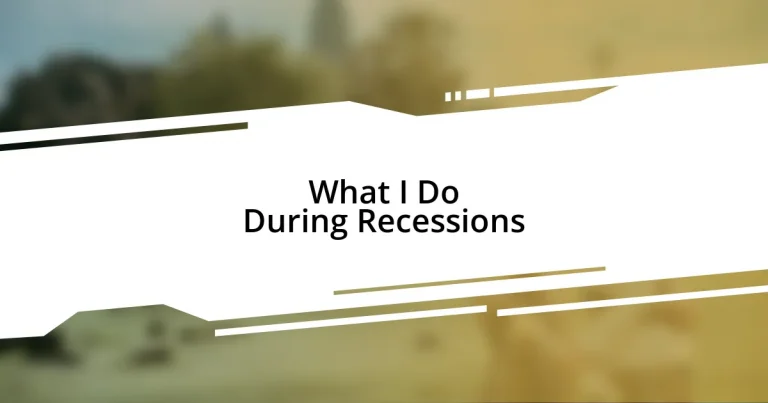Key takeaways:
- Recessions create significant emotional and financial stress, influencing consumer behavior and spending habits.
- Building financial resilience involves budgeting, diversifying income streams, and establishing an emergency fund to navigate uncertainties.
- Managing investments requires reassessing risk tolerance, focusing on defensive stocks, and staying informed about market trends.
- Investing in skills and networking can open new career opportunities and enhance professional growth during economic downturns.
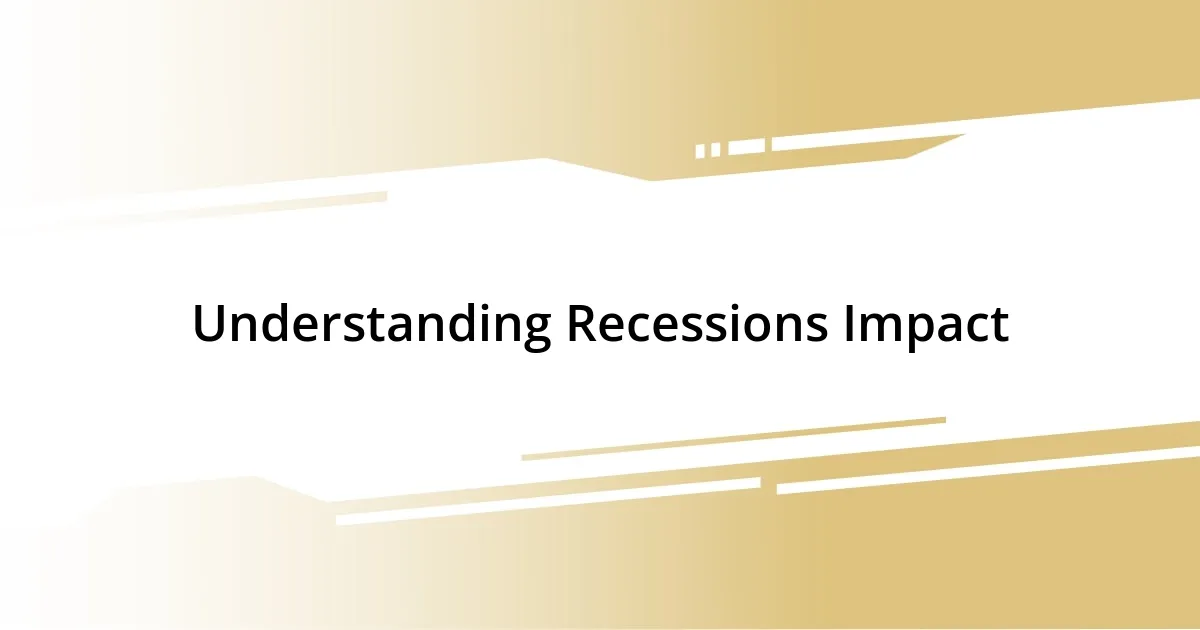
Understanding Recessions Impact
Recessions can feel like a sudden jolt, can’t they? I remember during the last downturn, I woke up one morning to news of layoffs in my industry, and it felt like a punch to the gut. The uncertainty of job security can create a ripple effect—not just for those directly affected, but for all of us who witness it.
People often underestimate the emotional toll that recessions take. The anxiety and stress associated with financial instability can affect mental health, leading to sleepless nights filled with worry. I found myself prioritizing my expenditures in ways I had never considered before, questioning every little purchase. How often do we take our financial security for granted until it’s threatened?
Additionally, the impact on consumer behavior can be quite fascinating. During tough economic times, I noticed a shift in my own spending habits—trading a fancy coffee for home-brewed alternatives became my norm. This isn’t just personal; it illustrates a broader trend where individuals become more cautious, which can ultimately slow economic recovery. Have you ever thought about how our choices during these times can shape the economy in the long run?
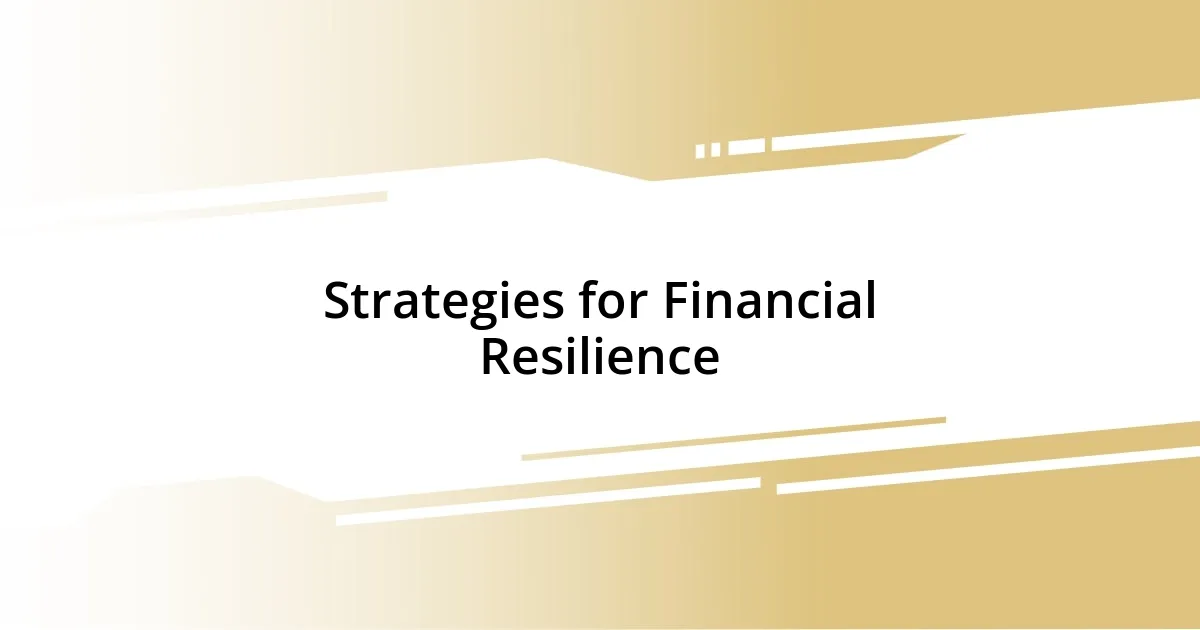
Strategies for Financial Resilience
When it comes to building financial resilience during recessions, one of the first strategies I implement is budgeting with a fine-tooth comb. I start by reviewing my current expenses and identifying non-essential items that can be cut back. It’s a proactive approach that not only helps me save money but also brings a sense of control amid chaos. I also turn to the envelope system, where I allocate physical cash into different envelopes for various spending categories. This tactic has honestly changed the way I view my spending; it makes each dollar feel more tangible.
Another strategy that I’ve found effective is diversifying income streams. It’s essential to have more than one source of income, whether it’s freelancing, passive investments, or a side hustle. I remember when I started teaching online courses a few years ago. Having that extra income during tight times was invaluable. Not only did it cushion the financial blow, but it also helped me develop a more rounded skill set. Have you ever thought about how multiple income avenues could provide peace of mind?
Lastly, I always prioritize building an emergency fund. A reliable safety net can make all the difference during economic uncertainty. I aim to save three to six months’ worth of living expenses, and I keep it in an easily accessible account. During my last financial crunch, having that cushion eased my anxieties tremendously. It was comforting to know that I had a financial buffer while reassessing my career options.
| Strategy | Description |
|---|---|
| Budgeting | Carefully analyze spending and cut unnecessary expenses. |
| Diversifying Income | Create multiple income sources to weather downturns. |
| Emergency Fund | Save 3-6 months’ worth of expenses for financial security. |
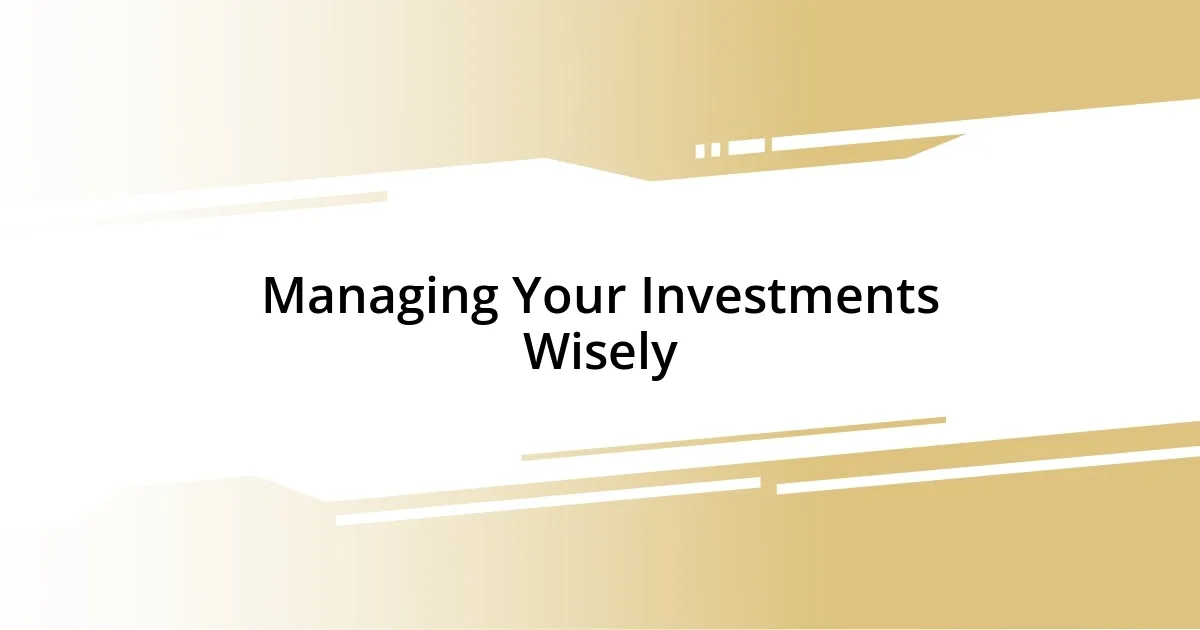
Managing Your Investments Wisely
Managing investments wisely during a recession is critical for safeguarding your financial health. I’ve often found that reviewing my investment portfolio becomes an essential exercise in pivots and reflections. For instance, during previous downturns, I learned to reassess my risk tolerance. What used to feel stable can quickly become volatile, and it’s crucial to stay aware of how external conditions can affect my holdings.
I make it a point to focus on sectors that tend to be more resilient during economic downturns. I remember once investing in utility stocks, which provided smoother sailing when the markets were turbulent. This conscious shift towards defensive stocks can provide a sense of security, knowing I’m positioned in more stable waters.
Here’s a simple strategy checklist I utilize for managing investments wisely during recessions:
- Reassess Risk Tolerance: Understand how much risk you can handle in uncertain times.
- Focus on Defensive Stocks: Consider stocks in sectors like utilities or consumer staples, which perform better in downturns.
- Diversify Investments: Spread investments across various sectors to reduce risk exposure.
- Stay Informed: Keep up to date with market trends and economic indicators that may affect your investments.
- Consult Financial Advisors: Seek professional advice to navigate through challenging economic landscapes.
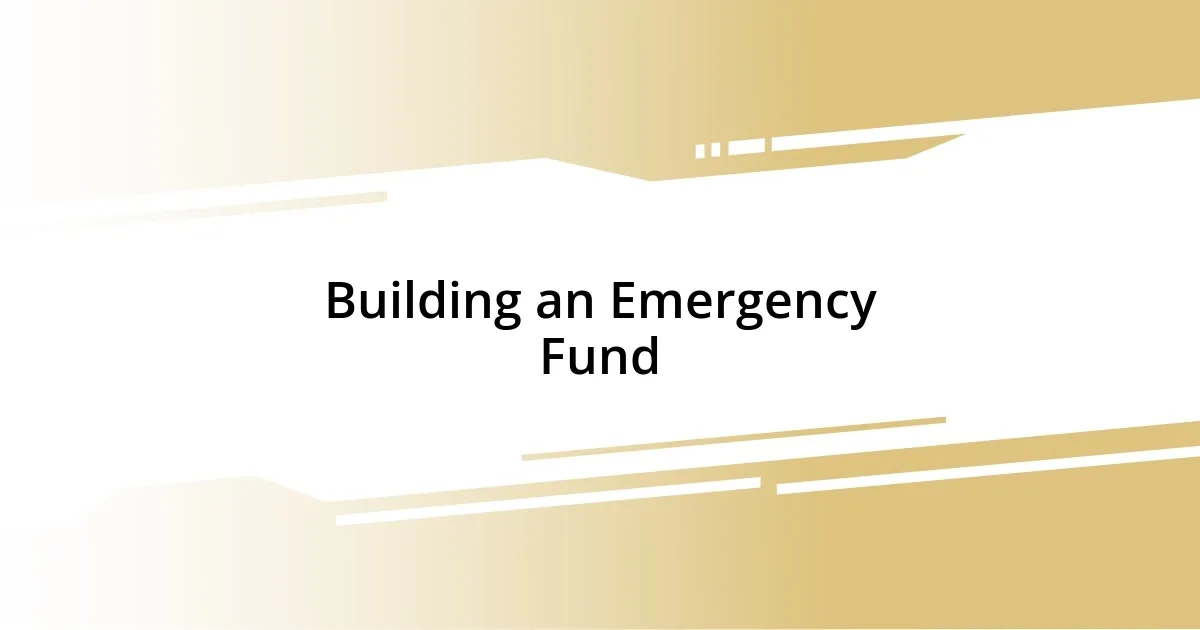
Building an Emergency Fund
Building an emergency fund is a foundational step I take when preparing for potential economic downturns. I usually begin by setting a clear savings goal—most times, I aim for about three to six months’ worth of living expenses. During a recent layoff, reaching that goal felt like I was armed with a shield against financial uncertainty. Knowing that I had that safety net allowed me to focus on finding a new job without the constant worry of immediate bills piling up.
I find that saving a little bit consistently adds up faster than one might think. To make this process more approachable, I automatically transfer a portion of my paycheck to a separate savings account dedicated solely to my emergency fund. This simple habit not only helped me accumulate savings more effectively but also transformed my mindset around money. Have you ever noticed how small, consistent efforts can lead to significant results over time?
There’s something incredibly reassuring about having a financial buffer during tough times. I vividly remember feeling a wave of relief when a sudden car repair bill came up. Instead of stressing over where the money would come from, I leaned on my emergency fund. It’s these moments that remind me just how crucial it is to prioritize savings. Ultimately, building an emergency fund brings peace of mind and empowers us to navigate the unpredictability of life with confidence.
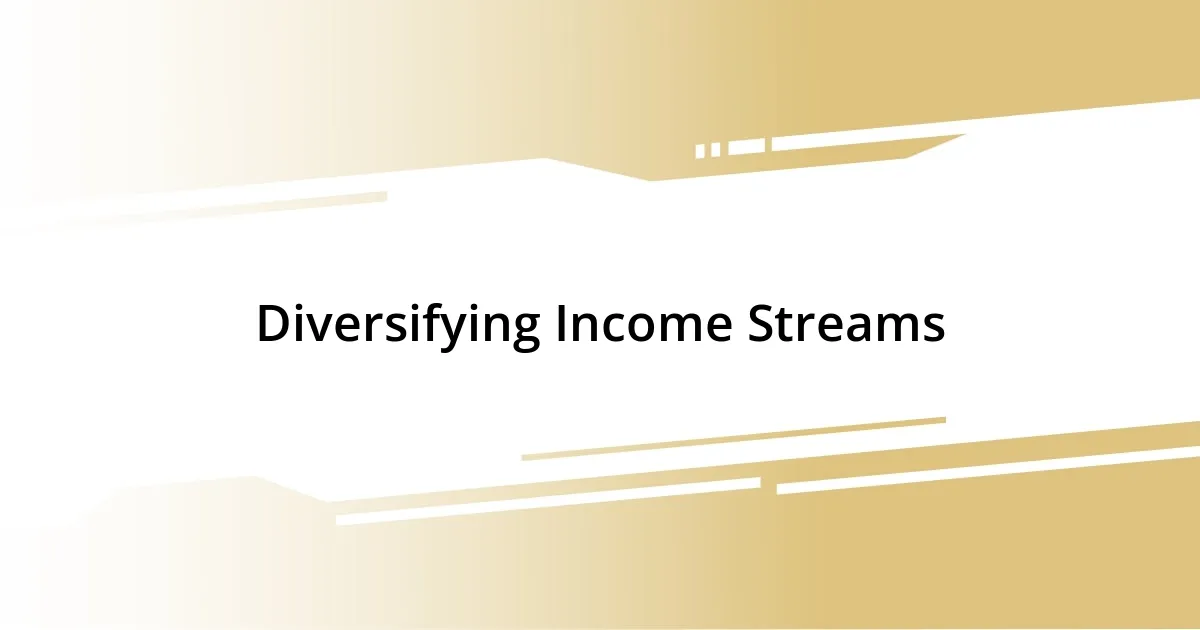
Diversifying Income Streams
Diversifying income streams is something I’ve found essential, especially when the economy takes a turn for the worse. For example, a few years back, I started a side hustle that aligned with my passion for writing. This extra income became a lifeline; during the recession, it filled the gaps left by my primary job’s instability. Have you ever considered how a little creativity can create additional financial security?
I also believe in the power of passive income. A while ago, I invested in real estate with the goal of generating rental income. Initially, the process felt daunting, but once I secured tenants, it became an incredible source of funds, helping me weather the storms of economic uncertainty. I can still recall the relief washed over me the month I received my first rent check—it was a reminder that my efforts were fruitful and provided a form of financial stability.
When it comes to diversifying income, I’ve learned that the key is adaptability. I remember struggling to find a balance when I took on freelance projects while maintaining my full-time job. At first, it seemed overwhelming, but I soon realized that this flexibility allowed me to explore various income sources. It infuses a sense of security, knowing that I’m not reliant on a single paycheck. Isn’t it comforting to imagine multiple avenues of income flowing into our lives?
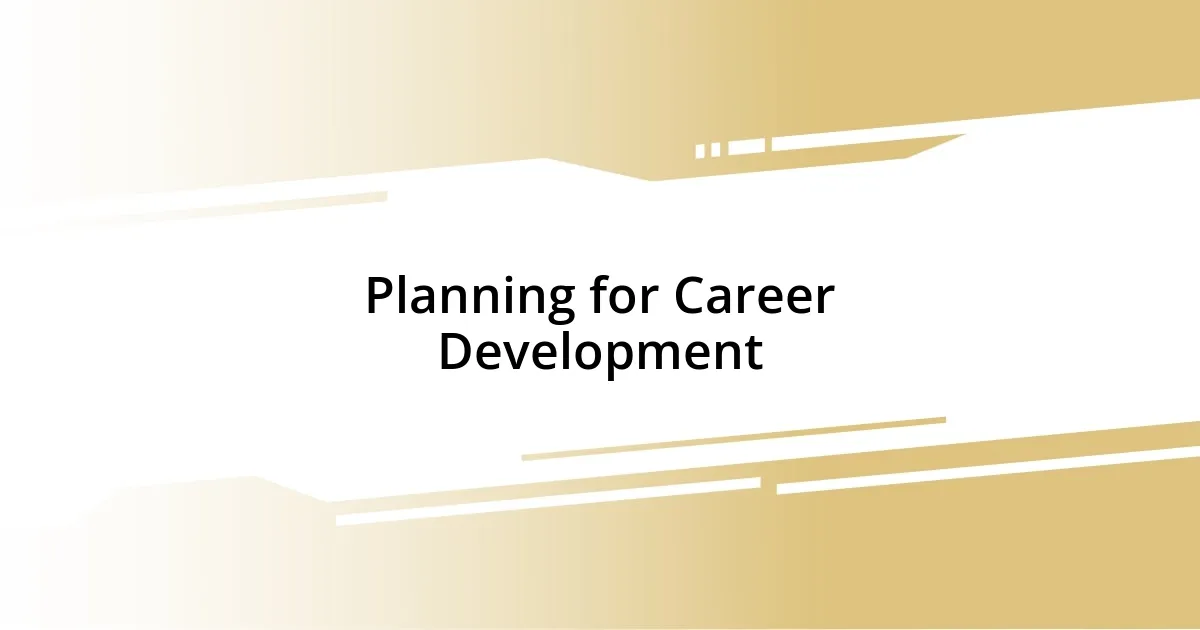
Planning for Career Development

Planning for Career Development
Investing in my skills has always been a top priority, especially during uncertain times. When I felt the impact of a downturn, I enrolled in an online course to hone my digital marketing expertise. This decision opened the door to new opportunities I hadn’t imagined before. Have you ever experienced that moment when a new skill suddenly changes your perspective on your career path?
I vividly recall the feeling of accomplishment after completing that course—it ignited a passion in me I thought I had lost. The knowledge gained not only boosted my confidence but also made my resume more appealing. Whenever I update my skills, I gain a sense of control over my professional destiny. Plus, it’s exhilarating to know that the investment I made in myself pays off both personally and professionally.
In times of stagnation, I often reflect on the importance of networking and building relationships. Attending industry events led me to invaluable connections that fostered new collaborations. Some of my best job leads have come from conversations sparked over coffee with fellow professionals. How often do we forget that the people around us can shape our career narratives significantly?
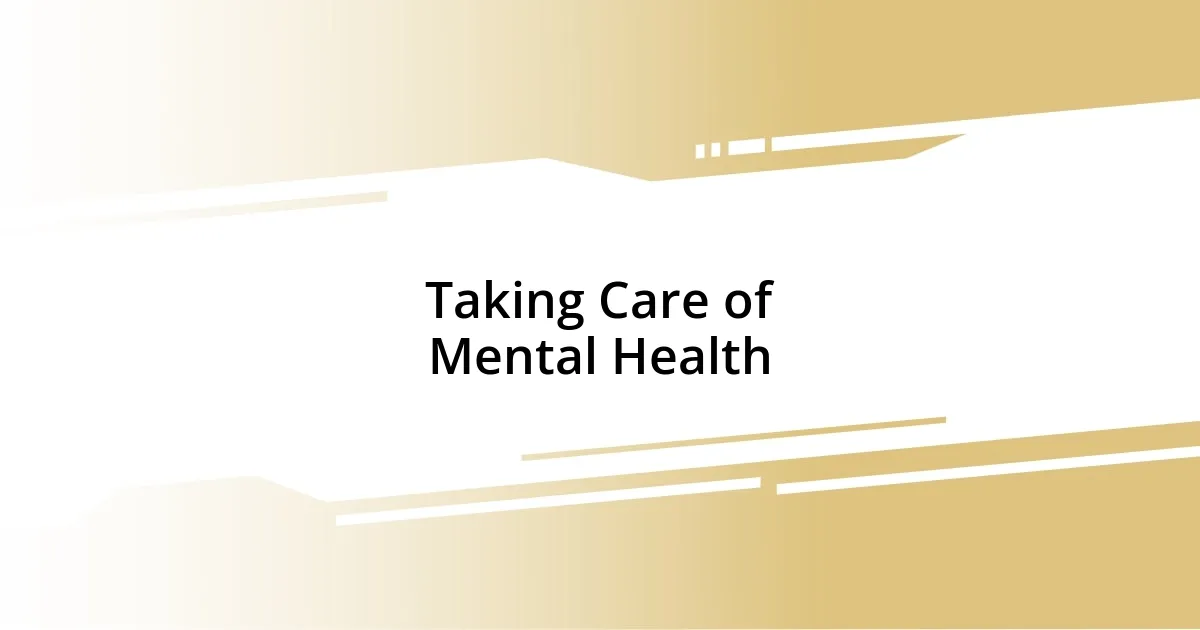
Taking Care of Mental Health
Taking care of mental health during a recession is something I prioritize with intention. I’ll never forget a particularly challenging economic downturn; I found myself overwhelmed by anxiety during those uncertain times. It was then that I discovered the profound impact of daily journaling. Putting my thoughts on paper not only cleared my mind but also revealed patterns in my emotions that I hadn’t noticed before. Have you tried reflecting this way? I highly recommend it.
Additionally, I make it a point to nurture my relationships, especially during tough times. One evening, feeling particularly stressed, I called a close friend to vent and share my worries. As we talked, I realized how just a simple conversation could lighten my heavy heart. This experience reminded me that reaching out isn’t just beneficial; it’s essential. Emotional support can be a game-changer, don’t you think?
Lastly, engaging in physical activity has become my refuge during recessions. I recall an instance where I laced up my sneakers and went for a run—breathe in, breathe out. That raw connection with nature allowed me to release pent-up emotions and refresh my perspectives. It’s fascinating how moving my body can shift my mental state so dramatically. How do you keep your spirits up when life feels heavy? I find that a walk or a quick workout does wonders for my mindset.












